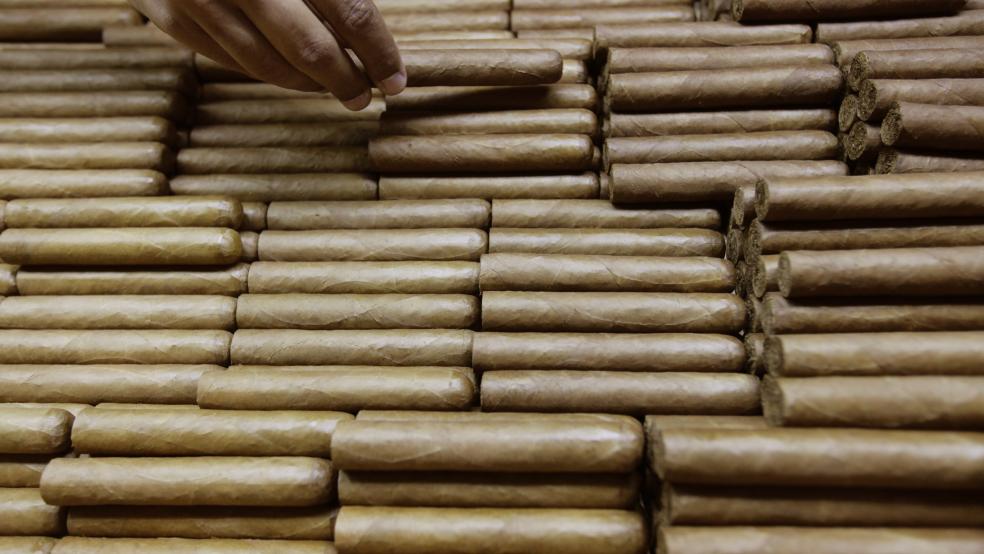Word that the United States and Cuba will be easing a trade embargo that has existed between the countries for more than half a century lit up interest in one industry perhaps more than any other: premium cigars. But tobacco insiders said it's not likely that Americans will be firing up their "Cubans" right away.
"It will be fantastic, obviously," said Rob Norris, CEO of cigar retailer and direct marketer JR Cigar. "Who knows what the news will be or how long it will take to take place, but that would be very exciting."
The United States imposed an embargo on Cuba in the early 1960s, following a communist revolution led by rebels under Fidel Castro who overthrew the U.S.-friendly regime there. The event ended what had been a brisk trade in cigars from Cuba to the United States—tobacco from the island nation is globally recognized as some of the world's best.
Related: Obama Renews Diplomatic Relations with Cuba
The new rules would allow U.S. travelers to bring up to $100 worth of Cuban tobacco back to the United States, though nominally it would be only for personal use.
"U.S. residents like Cuban cigars not only because of their quality, but also because they were prohibited," said Pedro Cabrera, co-owner of Bavaro, the Dominican Republic-based retailer and manufacturer of Cigarros Pedro Lopez. Cabrera called Wednesday's developments "huge news."
In fact, that trade never really ceased. Despite the sale of Cuban cigars being illegal, the United States has remained the world's biggest consumer of Cuban cigars, said Greg Zimmerman, secretary of the International Premium Cigar & Pipe Retail Association, and the proprietor of The Tobacco Company, a retailer in Pennsylvania.
Now, however, that-once illegal trade looks like it will go aboveboard.
"It's good news. It's kind of something that the industry has been looking for for a lot of years," Zimmerman said.
Related: Republican Boehner calls Obama's Cuba deal a 'mindless concession'
But the consumers seeking Cuban tobacco from hundreds of other tobacco shops across the country may not get their fix immediately. Zimmerman pointed out that as growers were exiled by Castro in the late 1950s and early 1960s, those producers continued to use their trademarks on tobacco they started growing in the Dominican Republic and elsewhere.
Some of the old tobacco trademarks from Cuba are no longer exclusive to the island, creating a situation where cigars are produced both in Cuba and outside of Cuba under the same brand name.
"I'm sure there's going to be a lot of legal battles ahead," Zimmerman said.
"Clearly, that's something to get through," agreed JR Cigars' Norris. "That's something the manufacturers will have to work out."
Certainly, an easing of trade restrictions between the United States and Cuba could produce losers as well as winner in the cigar industry. Cabrera predicted a threat to cigar sales from the Dominican Republic into the United States, for example, though he said any downturn would be temporary. Aside from the Dominican Republic, major cigar-producing nations include Honduras, Mexico, Ecuador and others.
Less temporary perhaps, would be the damage done to the makers of counterfeit "Cubans."
"A lot of people think they're smoking Cubans when they're actually smoking counterfeits," said Manuel Busciglio, general manager at Edward's Pipe & Tobacco Shop, a Tampa-based tobacco shop. Busciglio added that some people buy a $150-box of what they believe are Cuban cigars, when in fact 99 percent of them are fake.
Related: Florida's Cuban Americans rejoice at U.S. policy overhaul
Busciglio agreed with Cabrera on the effects a new flow of Cuban tobacco would have on cigars from other countries, saying the big Caribbean island produces tobacco with a "mystique" for Americans.
"I think the rush will last for about a year, maybe more. But it'll come down once people get sick of paying $30 for one stick," he said.
Busciglio has been working at Edward's for over 14 years and said he thought this would happen sooner. "I thought this was coming about 10years ago."
This article originally appeared in CNBC.
Read more at CNBC:

